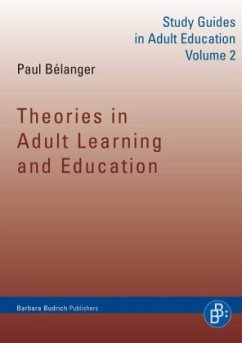Adult Learning and Education The graduate student guide in adult education explores theories of adult learning and adult education participation. It provides a frame of reference for understanding the development of a rapidly evolving field and for enhancing knowledge and competencies in this professional domain. The publication is divided into two sections: a section on adult learning theories and a section on adult education participation theories. If Adult Learning and Education (ALE) is now a recognised professional field, the theoretical perspectives, underlying practices and policies draw on a variety of academic disciplines. Various theories of learning and of adult education participation shape the practice and the "engineering" of adult learning. In the first section, this study guide provides a review of the most important learning theories, including behaviourist, cognitive, and constructivist approaches, their modern development, as well as specific developments in adult education theory. The second section examines the psychological and sociological theoretical backgrounds of adult education participation in order to understand the factors at work in participation patterns along the adult life course and between different social contexts. Observing the relativity of social reproduction allows to identify the conditions and variables that need to be addressed in order to alter prevailing trends.
This short book by one of the most eminent writers on adult education today is infact two books wrapped into one volume. The first consists of a survey of differenttheories of learning and adult learning. The second book discusses the statisticalevidence for the participation of adults in different lifelong learning programmesand activities in a number of Western countries. Both are very valuablecontributions to the study of adult and lifelong education. The volume is intendedfor students, and exercises and readings are given; the latter are particularly usefulsince the references for many of the readings suggested include weblinks, makingthis a very valuable tool of accessible sources for the study of adult and lifelongeducation. International Review of Education 3/2013

